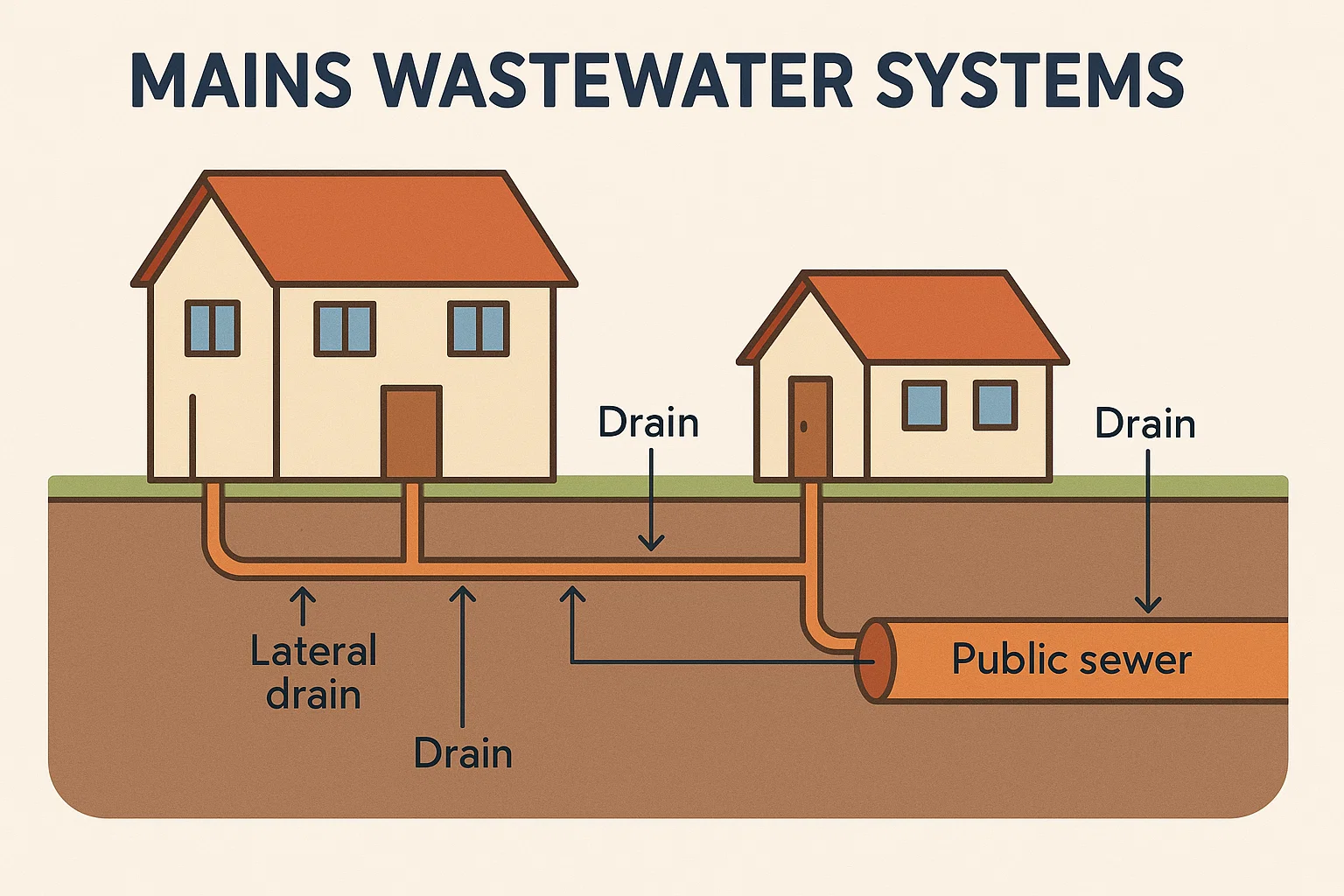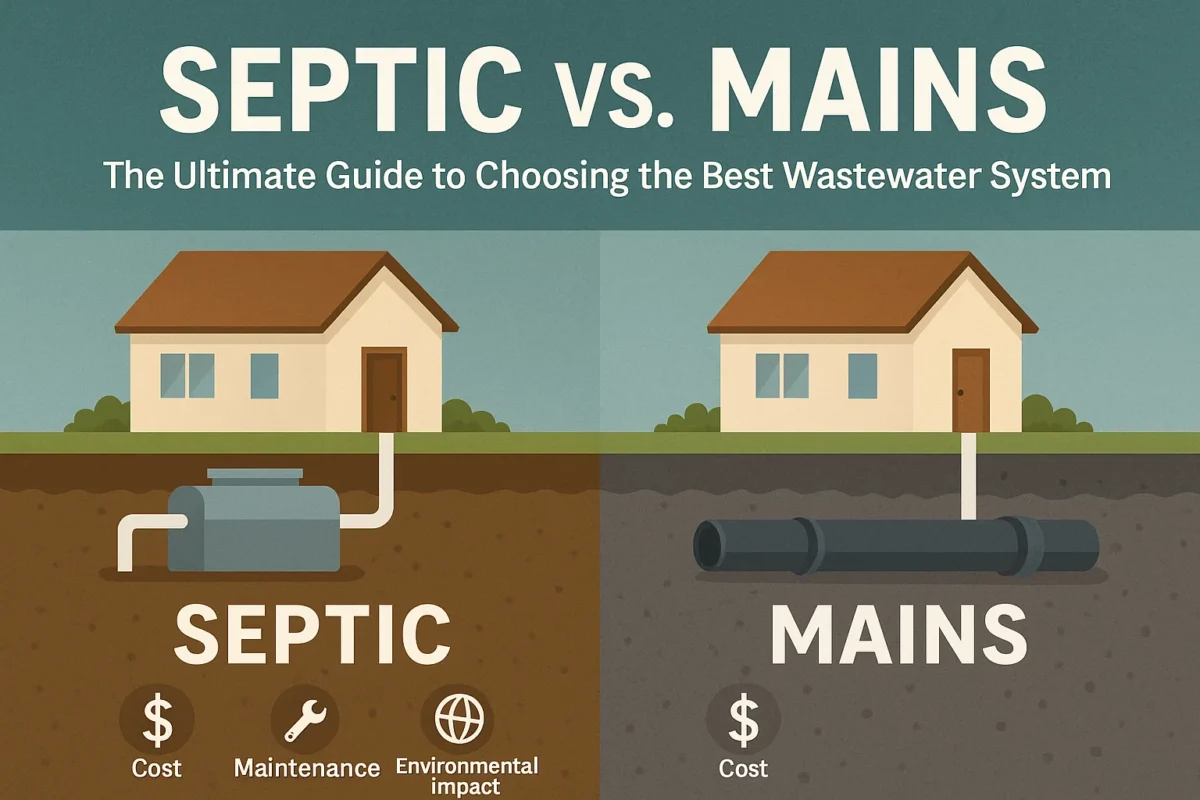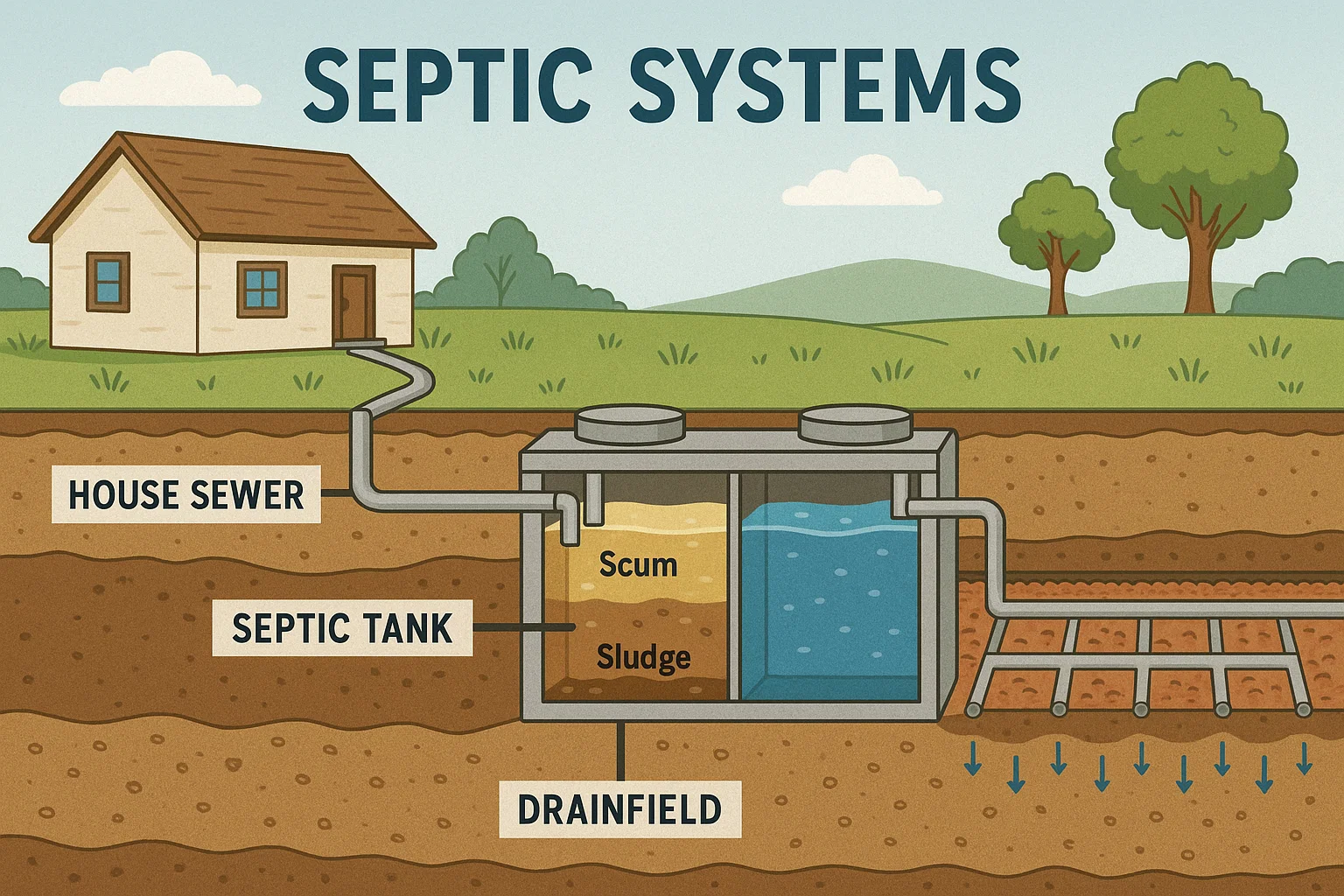Construction, Engineering
Septic vs Mains: The Ultimate Guide to Choosing the Best Wastewater System
You are not alone if you feel stuck deciding between septic and mains. Many homeowners worry about making the wrong choice. Maybe you are tired of guessing costs or fear constant repairs. Perhaps you wonder if you will regret the system you pick. It is frustrating to feel unsure about something so important for your home.
Imagine not having to worry about backups, smells, or huge bills. Picture a system that works quietly in the background, year after year. No stress. No surprise expenses. Only peace of mind knowing your wastewater is managed right.
That is possible. But first, you need to understand how septic and mains work, their pros, their costs, and how to pick the best one for your home. At Nyolenju Structures Limited, we have helped many homeowners like you choose wisely and avoid costly mistakes. Let’s break it down step by step.
What Does Septic vs Mains Mean?
When people talk about septic vs. mains, they are comparing two very different ways of handling wastewater. Both systems do the same basic job. They take away used water from sinks, toilets, and drains. But how they do it, who controls it, and what it costs are very different.
A septic system is private. You own it. You are responsible for it. It sits on your property, usually buried underground. Wastewater flows from your home into a large tank. Inside that tank, waste separates into solids, liquids, and grease. Natural bacteria break down some of the waste, while the liquid flows into the ground through a soak away or drain field. You do not share this system with anyone else.
A mains system is public. It is owned and managed by the local authority or government. Your home connects to a large network of pipes under the street. Wastewater from many homes flows together to a treatment plant. At the plant, machines and chemicals clean it before it is released back into rivers or reused for other purposes. Once connected, you have very little to worry about because experts maintain the system.
So the main difference is control. Septic is independent, giving you full control but also full responsibility. Mains is shared, giving you less control but almost no maintenance.
If you live in a city, mains are usually the standard. If you live in a rural area where mains pipes do not reach, septic is often the only option.
Understanding Septic Systems
A septic system is a private wastewater treatment solution designed for homes not connected to public sewers. It works quietly underground and, when maintained well, can last for decades. Many rural homes depend on septic systems because they offer independence from city services.
Septic Tank Structure and Function
At the heart of the system is the septic tank. This tank is buried in the ground, usually made of concrete, fiberglass, or plastic. Wastewater from your sinks, toilets, and showers flows into it. Once inside, the tank begins to separate the waste into three layers.
Heavy solids settle at the bottom and form a thick layer called sludge.
Oils and grease float to the top, creating a layer called scum.
The middle layer is liquid wastewater, also called effluent, which eventually flows out of the tank.
The tank is designed to hold waste long enough for bacteria to break down some of the solids. The sludge and scum stay in the tank until it is pumped out during maintenance.
Wastewater Treatment in Septic Systems
The liquid wastewater, or effluent, moves from the tank to a drain field or soakaway. This is a network of perforated pipes buried in gravel or soil. As the effluent soaks into the ground, natural soil bacteria filter and treat it. Cleaned water eventually returns to the groundwater.
A healthy septic system depends on natural processes. Good bacteria must thrive inside the tank to break down waste. Harsh chemicals can kill these bacteria, leading to system failure.
Why Septic Systems Need Regular Care
Over time, sludge and scum build up in the tank. If it is not pumped every three to five years, waste can clog the drain field. This can lead to bad smells, slow drains, and even costly repairs. Proper care ensures the system runs efficiently and protects the environment.
Understanding Mains Systems
A mains system is a public wastewater solution managed by the local authority or government. Most urban homes use mains systems because they are reliable, convenient, and require little attention from homeowners. Once your home is connected, the system works automatically with almost no effort on your part.

Public Sewer Infrastructure
The mains system is made up of a network of large underground pipes. These pipes collect wastewater from many homes and businesses and carry it to a central treatment plant. Your home connects to this system through a service line that links directly to the public sewer.
The pipes are designed to handle large amounts of wastewater every day. Because the system is shared, maintenance and repairs are carried out by the local authority or a contracted service provider, not by the homeowner.
Wastewater Treatment Plants
Once wastewater reaches the treatment plant, it goes through several stages of cleaning. Large filters remove solid materials such as plastic and other debris. After that, special tanks and machines separate sludge from liquid waste. Aeration tanks add oxygen to help bacteria break down harmful waste. Finally, chemicals or ultraviolet light are used to kill dangerous germs before the water is released into rivers or reused for irrigation and other purposes.
Why Mains Systems Are Trusted
Mains systems are highly regulated to protect public health and the environment. The treatment process ensures that the water leaving the plant is safe. Because professionals handle all maintenance, homeowners rarely need to think about the system. It is the easiest option for people living in cities or suburban areas.
Septic vs. Mains: Key Differences
| Factor | Septic System | Mains Sewer |
|---|---|---|
| Installation Cost | $3,000 to $7,000 | $500 to $2,000 |
| Maintenance | Pumping every 3 to 5 years | Almost none for homeowners |
| Environmental Impact | Good if maintained | Uses more energy at plants |
| Space | Needs land for a drainage field | No extra land needed |
| Independence | Works off-grid | Depends on public services |
Advantages of Septic Systems
Septic systems offer several benefits, especially for homeowners in rural or semi-rural areas. They provide independence, can be cost-effective in the long run, and, when maintained properly, can be friendly to the environment. Here is why many homeowners prefer septic systems.
Cost Effective for Rural Properties
For homes far from public sewer lines, connecting to the mains can be expensive. The cost of running pipes from your property to the nearest mains system can be much higher than installing a septic system. Once installed, a septic tank only needs routine pumping every few years, making it affordable over time.
Independence from Public Utilities
A septic system gives you full control over your wastewater management. You are not dependent on city services or public maintenance schedules. Even during service interruptions or problems with municipal systems, your septic system continues to work as long as it is properly maintained. This makes it ideal for remote locations and off-grid living.
Long Term Environmental Benefits
When a septic system is well designed and maintained, it helps return treated water to the soil naturally. This process can recharge local groundwater supplies. Because it treats water on-site, it reduces the energy and resources used in transporting wastewater to large treatment plants.
Durability and Longevity
With proper care, a septic system can last for decades. Tanks made of high-quality materials can serve a home for 20 to 30 years or even longer with regular pumping and inspections.
Privacy and Control
Septic systems allow you to manage your own wastewater without relying on public utilities. You can monitor its condition, schedule maintenance when needed, and make improvements based on your preferences.
Advantages of Mains Sewer Systems
Mains sewer systems are the preferred choice for most urban and suburban homes. They are convenient, reliable, and require almost no involvement from homeowners. Once your home is connected, wastewater is handled by professionals, giving you peace of mind. Here are the key benefits of using a mains system.
Low Maintenance for Homeowners
One of the biggest advantages of mains systems is that you do not have to maintain them yourself. The local authority or water service company is responsible for inspections, repairs, and upgrades. Unlike septic systems, you do not need to schedule pumping or worry about managing sludge buildup.
Reliable Wastewater Management
Mains systems are designed to handle large volumes of wastewater every day. They rarely fail because they are monitored and maintained by trained experts. If a problem does occur, it is usually fixed by the city or service provider, not by you. This makes it ideal for busy households that want a worry-free solution.
Space Saving Solution
Unlike septic systems, mains sewers do not need extra land for a drain field or soakaway. This makes them perfect for properties in cities and suburbs where space is limited.
Strict Regulation and Safety
Public sewer systems are regulated by health and environmental authorities. This ensures wastewater is treated properly before being released into rivers or reused. You can be confident that the system meets strict safety standards without having to manage it yourself.
Long Term Convenience
Once you are connected to a mains system, you do not have to think about it again. There are no regular service schedules to track, no inspections to arrange, and no risk of backups if the system is managed properly.
Septic vs Mains: Which Works Best for Rural Homes?
For rural properties, septic systems are often the better choice. In many remote areas, mains sewer lines are not available. Even when they are, connecting to them can be very costly. Septic systems give rural homeowners control, independence, and long-term savings.
Why Septic Systems Are Better for Rural Areas
Septic systems are designed for locations with plenty of open land. They work well where soil can absorb treated water and where space is available for a drain field. Because they treat wastewater on-site, there is no need to rely on public infrastructure. This independence is valuable for people living far from towns or cities.
The installation cost of a septic system may seem high at first, but it is usually cheaper than paying to extend mains pipes to a rural property. Once installed, maintenance is simple. Pumping every three to five years and basic care are enough to keep the system running for decades.
When Mains May Be Considered in Rural Areas
Some rural communities have mains sewer connections, especially if they are close to towns. If a mains line is already nearby, connecting to it can offer convenience. However, in most rural locations, installing a septic system remains the most practical and cost-effective option.
Final Thought for Rural Homes
If you have space, good soil, and no close access to mains, a septic system is almost always the right choice. It offers reliability and independence, which is important for rural living.
Septic vs Mains: Which Works Best for Urban Homes?
For urban homes, mains sewer systems are almost always the best choice. Cities and suburban areas are built with public sewer networks designed to handle large volumes of wastewater. Septic systems, while effective in rural areas, are not practical for most city properties.
Why Mains Systems Are Better for Urban Areas
Urban properties often sit close together with little extra land. Mains systems do not need a drain field or soakaway, making them ideal for small yards or apartment buildings. The connection is simple. Once installed, wastewater flows directly to public treatment plants, and you never need to think about it.
The maintenance is handled by the local authority or water company. You do not need to pump a tank, worry about soil drainage, or monitor bacteria levels. For busy city homeowners, this convenience is a major advantage.
When Septic Systems May Be Used in Urban Areas
Septic systems are rare in urban locations. In some edge-of-town areas, a septic tank may be used if mains pipes are not available. However, city rules often require properties to connect to the mains if the option exists.
Final Thought for Urban Homes
If you live in the city, the mains system is almost always the right choice. It is convenient, space-saving, and fully managed by professionals. Septic systems are better suited for rural properties with open land and no access to public sewers.
Legal Requirements and Regulations
Understanding the rules for wastewater systems is important. Both septic and mains systems have strict guidelines to protect health and the environment.
Permits and Inspections for Septic Systems
You need approval before installing a septic system. Local health or environmental offices issue permits. The land is checked to see if the soil can absorb treated water. The system design must meet local standards. Inspections are often required after installation to confirm it works correctly.
You may also need periodic checks. Some areas require proof that your tank is pumped every few years. Failure to follow these rules can lead to fines or forced repairs.
Connection Requirements for Public Sewers
If mains sewers are available, you may be required to connect. Many cities do not allow septic tanks where public pipes are close by. Local authorities handle the connection process and check that it meets safety standards.
In some regions, switching from septic to mains becomes mandatory if a public sewer line is extended to your area.
Why Following the Rules Matters
These rules protect groundwater and public health. A poorly installed or neglected system can pollute drinking water and harm the environment. Following regulations also keeps you safe from legal issues and expensive repairs.
Common Problems and How to Avoid Them
Both septic and mains systems can develop problems if not cared for. Knowing the signs early can save you money and stress. Proper maintenance is the key to keeping either system working well.
Septic System Failures and Maintenance Tips
A common septic problem is a clogged drain field. This happens when the tank is not pumped on time. Waste builds up and blocks the soil from absorbing water. Bad smells, wet patches in your yard, and slow drains are warning signs.
Pump your tank every three to five years. Never flush wipes, grease, or chemicals into the system. Use cleaning products that do not kill the helpful bacteria in the tank. Watch for gurgling sounds in drains. Call a professional if you notice any unusual changes.
Mains Sewer Blockages and Solutions
Blockages in mains pipes are often caused by grease, wipes, or hair. These items harden or stick inside the pipes. You might notice water draining slowly or hear strange sounds from your sink.
Do not pour cooking oil or grease down the sink. Throw wipes and sanitary products in the trash, not the toilet. If you suspect a blockage, call your water service provider or a licensed plumber. Trying to fix it yourself can make the problem worse.
Cost Comparison Table: Septic vs. Mains
| Expense | Septic | Mains |
|---|---|---|
| Installation | $3,000 to $7,000 | $500 to $2,000 |
| Annual Upkeep | $200 to $500 | $50 to $150 |
| Lifespan | 20 to 30 years | No limit (public system) |
How Nyolenju Structures Limited Can Help
Here is how we guide you:
Site Assessment
We inspect your land and location to know what suits you best.Cost Evaluation
We give you a clear cost plan for both septic and mains.Installation or Connection
We build or connect the system to meet legal and safety standards.Maintenance Support
We offer regular checks to keep your system running smoothly.
FAQs
1. Which costs less long term?
Mains often cost less because upkeep is minimal.
2. Can I switch from septic to mains?
Yes, but it can be expensive if you are far from the mains line.
3. How often should a septic tank be pumped?
Every 3 to 5 years, depending on use.
4. Which is safer for the environment?
A well-maintained septic is very safe. Poor care can harm groundwater.
5. Can I install septic in the city?
Most cities do not allow it if mains are available.
6. Does septic smell bad?
No, not if it is maintained properly.
Final Verdict: Which Should You Choose?
The right choice depends on where you live, your budget, and how much maintenance you can handle. Both systems work well when installed and maintained properly, but they suit different lifestyles.
When to Choose a Septic System
Pick a septic system if you live in a rural area with no access to mains pipes. It is also the better choice if you want independence from public services. You control when to maintain it, and it can be cheaper long term. Make sure you have enough land for a drain field and are ready to schedule regular pumping.
When to Choose a Mains System
Choose mains if you live in a city or suburban area. It is simple, reliable, and requires little attention. Professionals handle all repairs and treatment. If public sewer lines are available near your home, this is almost always the better choice.
Think About Your Long Term Needs
If you want low maintenance and live in a developed area, mains is best. If you prefer control and live far from public lines, septic is the way to go. Both can last for many years if cared for.
Conclusion
What would it feel like to never stress about your wastewater system again? Are you ready to make the right choice for your home?
Take the first step today.
Contact Nyolenju Structures Limited for a free consultation. We will help you choose and install the best system for your home with no guesswork.



